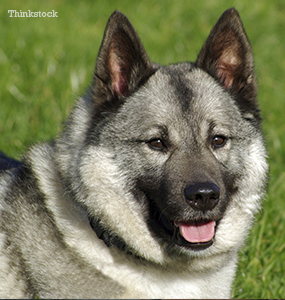Background
The Norwegian Elkhound hails from Scandinavia where he would work as a guard dog and help the Vikings hunt for game such as bear and moose. Elkhound's were also herders of flocks and defended the farm from wolves and bear. This breed was built with the stamina to walk all day on rugged terrain.
The Norwegian Elkhound was recognized by the American Kennel Club in 1913.
Sizing up
- Weight: 48 to 55 lbs.
- Height: 19.5 to 20.5 inches
- Coat: Double, with a coarse top coat and a soft, woolly undercoat
- Color: Any color combinations of black, grey, or silver
- Life expectancy: 10 to 12 years
What’s the Norwegian Elkhound like?
The Norwegian Elkhound is an active, loving, and vocal breed. He will need plenty of daily exercise whether it’s a jog down the street or a game of fetch. He is happiest around his people and so does not like being left out. He is great with children as long as he’s raised with them and they’re respectful. Screaming toddlers may scare him unless he’s already been acclimated to them. Due to his propensity to bark frequently, be prepared to teach him good and bad times to bark or you may have some unhappy neighbors at your door.
The Norwegian Elkhound is very intelligent making it a little easier to train him, but you should still begin training the day you bring him home or as early as possible. Use positive reinforcements and food rewards to help you motivate. He tends to have a short attention span, so keep training sessions short and interesting.
You should brush your Norwegian Elkhound’s thick double coat about twice a week or as needed during shedding times. Make sure to brush out all of the tangles or mats to keep his coat looking healthy and beautiful!
Health
These conditions may be of concern to the Norwegian Elkhound:
Glaucoma
Pyotraumatic dermatitis
- A skin condition that causes inflammation and discomfort, usually seen in dogs with a thicker coat
- One of the most common diseases seen in dogs and ultimately a malfunction of the hip joints
- A disease caused by a decrease in metabolism due to an under-active thyroid hormone
Fanconi syndrome
- A kidney disease that occurs when the tubules of the kidneys aren’t functioning correctly
Retinal dysplasia
- A hereditary disease caused by folds or clumps in the retinal tissue
Progressive retinal atrophy
- An eye condition that worsens over time and could lead to a loss of vision
Takeaway Points
- The Norwegian Elkhound sheds often.
- The Norwegian Elkhound needs plenty of daily exercise.
- The Norwegian Elkhound is a dog that needs human companionship.
- The Norwegian Elkhound would make a great hunting companion.
If you have any questions or concerns, you should always visit or call your veterinarian -- they are your best resource to ensure the health and well-being of your pets.
